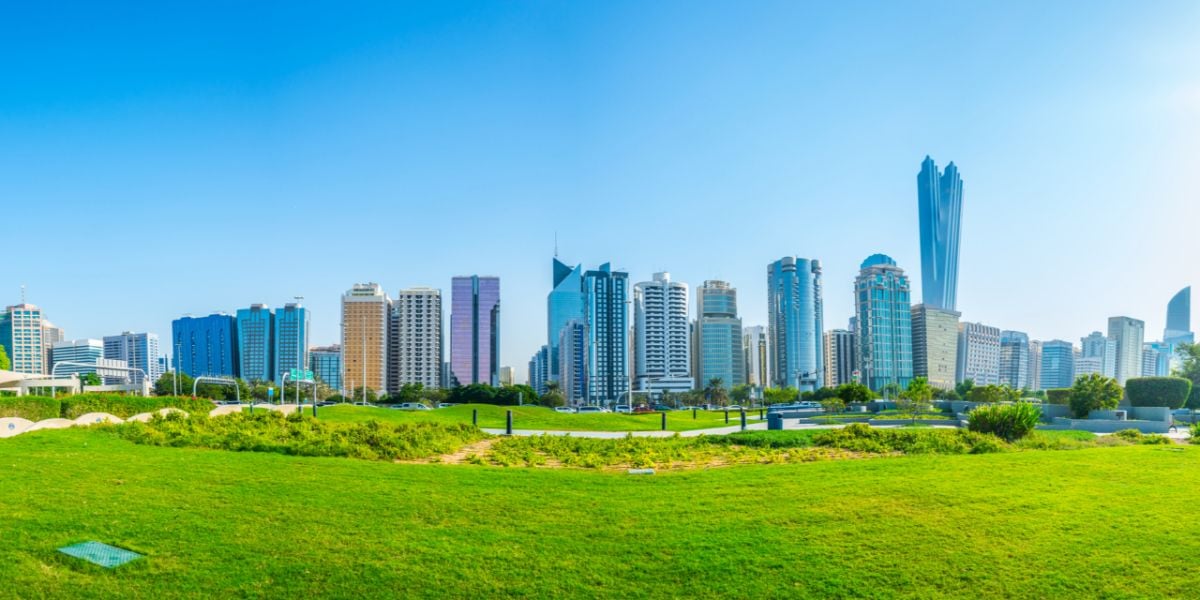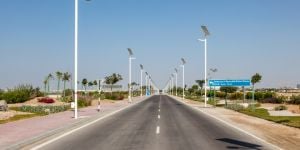
Accommodation is your next step after securing a visa to fully settle into your new life as an expat in Abu Dhabi. Finding a place to live in Abu Dhabi is not particularly difficult. You will have a good selection of options for rent — however, it does get a bit more complicated if you want to buy property.
This mini Abu Dhabi accommodation guide offers a quick overview of housing options available in the emirate, popular neighborhoods, real estate market specifics, and more. For more general information on renting and purchasing property in the UAE, refer to the Accommodation in the United Arab Emirates article. Thinking of moving to another emirate? We also have guides on Accommodation in Dubai and Accommodation in Ras Al-Khaimah.
Rent or buy accommodation in Abu Dhabi?
The first decision you will need to make regarding accommodation in Abu Dhabi is whether to buy or rent. Naturally, both have pros and cons.
A lot of expats living in big emirates like Abu Dhabi and Dubai choose to rent. Renting offers lots of flexibility and is definitely a safer option if you are coming to the UAE for the first time and are not sure about your plans. When you rent, you can easily travel between neighborhoods and the emirates and even leave the UAE when you want to without strings attached. It's important to keep in mind, though, that most tenancy contracts are set for a whole year, and a penalty must be paid if broken ahead of time.
However, if you plan to build a life in Abu Dhabi and will be staying here for the long term, renting can get expensive. In this case, you may want to look into buying property in Abu Dhabi. Another reason to buy property in the UAE is investment. As the population in big emirates continues to increase, accommodation is always in high demand. While property prices have increased over the past few years due to an influx of tourists and expats alike, there are plenty of off-plan options for purchasing real estate, which makes it both affordable and worth the investment. Moreover, investing in real estate in Abu Dhabi (with a market value upward of AED 2,000,000) qualifies you for the Golden Visa Program. Under this program, you will be able to become a resident in Dubai with a 10-year validity after you have purchased real estate in the country.
Types of accommodation in Abu Dhabi
There are several living options in Abu Dhabi, depending on your preference and/or family size. This means you can opt for a flat (a studio, one-bedroom, or more than one bedroom), a townhouse or villa (perfect for larger families, more spacious, and usually comes with a garden and garage), hotel apartments (generally for those transitioning into life as an expat in the city), or luxury villas for those with high-end accommodation packages. These living spaces sometimes come furnished or unfurnished.
Location is important when it comes to finding a home. One of the most popular choices for families who opt for villa-type living is Khalifa City because of its convenience. Rent is cheaper for a bigger space with amenities within reach, including schools, supermarkets, and hospitals. This is if you do not mind the drive to and from the city. If you don't mind paying a little extra, Al Raha is another popular choice for villa communities.
Abu Dhabi is convenient to navigate around, but it still pays to consider the commute to and from work. It is up to you if you wish to live close to your workplace or do not mind the drives to the city to save on rent.
Popular residential areas in Abu Dhabi
There are different neighborhoods in Abu Dhabi, and each area has its own perks and downsides.
Abu Dhabi City Centre, also called downtown, is where all the shops, malls, and popular hotels are located. This neighborhood is Abu Dhabi's heart and home to the emirate's tallest building and lots of offices. You will mostly find modern high-rises here, and it's a great place to settle if you are looking for an active urban lifestyle.
Al Zahiyah (formerly known as the Tourist Club Area) is another popular choice. It's located right in the middle of the Corniche Road, which means easy access to the sea. It's also home to a number of restaurants and shops, meaning you won't need to go very far for a nice day out with family or friends.
Mohamed Bin Zayed City offers more affordable residential options, especially for villas, compared to those downtown. It is not far from the city center but offers a quieter and more relaxed pace of life. You'll also find a few of the emirate's top schools in this area, making it ideal for families with children.
In Khalidiya, you will find both modern high-rise and low-rise buildings. The neighborhood has lots of greenery for its residents to enjoy, and five-star hotels are available for short-term visitors. It's got the perfect blend of local and expat communities for those who want to integrate more into the UAE's lifestyle. It's also unique due to its mix of traditional Emirati architecture and modern buildings.
The most popular areas for buying properties include Al Reem Island due to its ultra-modern developments, Yas Island due to the area's vibrant community and abundance of leisure activities, and Al Raha Beach due to its offering of beautiful beaches and accessible amenities.
Rent prices in Abu Dhabi
Studio apartments cost between 15,000 AED and 115,000 AED, depending on the size and location. Khalifa City A, for example, is a popular choice for reasonably priced studio apartments.
A one-bedroom can cost around 25,000 to 250,000 AED a year. Location is the biggest factor with regard to the price difference here.
Two-bedroom apartments cost around 35,000 to 450,000 AED and above, depending on the type of property and its location.
For the most recent information on rent prices in Abu Dhabi, check out available property listings on Bayut.
Good to know:
Some employment contracts in Abu Dhabi will come with assisted housing. This means that your employer may either provide you with housing or offer a housing allowance for the duration of your contract. Some employers will give you cash that is included in the salary package, while for others, the housing allowance is deducted from your salary.
Villa-type accommodation costs range from 55,000 to 150,000 AED and above. As mentioned, this is all dependent on where you choose to live. For example, a three-bedroom apartment in downtown Abu Dhabi will cost around 130,000 AED a year, and you could find a villa in Abu Dhabi Gate City for the same price.
How to find accommodation in Abu Dhabi
Thanks to the availability of online resources, you can start your apartment search in Abu Dhabi long before your scheduled arrival. In fact, it may be a good idea to invest some time into researching the emirate's real estate market so that you can make more informed decisions on the spot.
Newspapers and websites
Start by checking local real estate websites or going over classifieds in local newspapers. Some of the most popular online real estate platforms include Bayut, Propertyfinder, Abu Dhabi Dubizzle, and others.
Real estate agencies
Once you have a better idea of what you are looking for, you can contact a real estate agency. Note that most rental contracts in Abu Dhabi are signed through an agent — in fact, this option is usually recommended for expats. Naturally, you will also come across properties listed by landlords directly. If you decide not to use an agency and rent directly instead, it is absolutely essential that you have someone look over your rental contract. You should also ask your local colleagues or your employer for help.
Touring neighborhoods
Once you are in Abu Dhabi, you can go ahead and start viewing properties that interest you. If you come across a particular residential building that you like, you can stop by that building's front office and ask the management if there are any properties available for rent.
Good to know:
Couchsurfing, though quite widespread in the country, is not officially authorized. You can, however, share an apartment with a flatmate.
Rights and obligations of tenants and landlords in the UAE
When renting in Abu Dhabi, make sure you are aware of and follow all tenant rules. Additionally, you should also be aware of your rights as a tenant and make sure your landlord fulfils all obligations on their side.
Here are some basic rules to follow for landlords and tenants in the UAE:
For landlords
The landlord must give you an English-translated copy of the rental contract. You should never be pressured to sign a document in a language that you don't understand.
The landlord must give you a receipt for your security deposit — whether you've paid via a bank transfer or in cash. This will usually also be documented in your official tenancy contract (called Tawtheeq).
The price of your rent must remain the same throughout the duration of your rental contract. Your landlord has the right to increase rent once the current contract is over. As a tenant, you have the right to re-sign the contract agreeing to the new rent or decide not to extend the lease. Keep in mind that the law in Abu Dhabi states a 5% increase cap on rentals, and your landlord must inform you at least 2 months prior to your renewal date.
If you are renting a furnished apartment or house, make sure the landlord gives you the list of all the items in the apartment. You must then check if the list of items is correct before signing it.
It's your landlord's responsibility to maintain common areas (hall, storage areas, etc.)
For tenants
As a tenant, it's very important that you study your rental contract carefully before you sign it. It's a good idea to have your colleague/employer/friend look over your rental contract. You should understand that once you sign the rental agreement, it becomes legally binding and no changes can be made to it.
On most contracts, you will be allowed to make minor changes to the rented property. However, any major alterations (painting walls, adding/removing furniture, etc.) should only be made after you get written approval from your landlord.
It is illegal to sublet or share an apartment you are renting without written consent from your landlord.
As a tenant, you must maintain the property in good condition. Note that you will need to pay for any damages done to the property at the end of your lease.
Important:
A rent check bouncing is a criminal offence in the UAE. If your payment doesn't come through, the landlord also has the right to evict you. Make sure to have your financials in order, and always double-check with your landlord about whether they have received the payment.
Buying property in Abu Dhabi
In April 2019, Abu Dhabi introduced a new property law that allowed foreigners to buy freehold property in selected zones. These zones are called “investment zones” and include the following neighbourhoods:
- Yas Island;
- Saadiyat;
- Reem;
- Mariya;
- Lulu;
- Al Raha Beach;
- Sayh Al Sedairah;
- Al Reef;
- And Masdar City.
Prior to the new law, only UAE and GCC nationals were allowed to buy property on freehold in Abu Dhabi.
What is a freehold property?
Buying property on freehold means that you get full ownership of said property. You can make any alterations that you see fit, rent it out, or sell it. Prior to the new law, expats in the UAE could only buy properties on leasehold in Abu Dhabi. Leasehold properties are technically not purchased but rather leased for the long term (up to 100 years). When buying property on leasehold, you will be able to rent out the property, but you shouldn't make any changes to it — unless these have been approved by the owner.
Useful links:
We do our best to provide accurate and up to date information. However, if you have noticed any inaccuracies in this article, please let us know in the comments section below.








